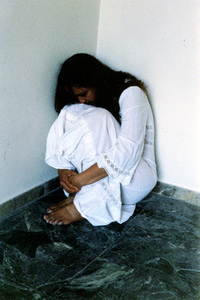Mental Illness and Murder in Illinois

In a recent Illinois appellate case, the defendant was convicted of first-degree murder under 720 ILCS 5/9-1(a)(1) and sentenced to natural life imprisonment. The defendant and several others were charged with six counts of first-degree murder in connection with the strangulation deaths of two men.
The case arose when the defendant’s father called the police to report two dead people in a residence occupied by a woman and her father. When the police came, the woman said there were two people hiding in the house. A cop found one of the hiding men upstairs with the bodies, which were face down with plastic bags over their heads. The man who was found said he’d killed one man, and the other man who was hiding had killed the other one.
The defendant wasn’t at the residence but was driving elsewhere. She was stopped and taken into custody, and she told the officer she wanted to talk and wanted to know how much time she’d have to serve as an accessory to murder. She was read her Miranda rights, which she waived. Her interrogation was recorded. She told the police she and her 15-month-old daughter were living in the woman’s house in Joliet. The woman lived on the second floor, and her father lived on the first floor. The woman’s boyfriend (the man who was hiding and then discovered) and the man who was hiding elsewhere in the house were with the defendant and the woman at the woman’s house.
The group didn’t have enough money to buy cigarettes and alcohol and were talking about how to get some money. The defendant got a text from one of the victims, asking if she wanted to drink alcohol with him and his friend (the other victim). The defendant told the group the victim always carried cash. The group decided to rob him.
One of the men said he could beat up and kill the victims and steal their money, and the other man said he’d help him. The defendant didn’t think anything would happen but went along. She lured the victims to the residence, and the group determined a signal for the women to leave the room so that the men could kill the victims.
When the two men got there, the group drank alcohol and played video games until one of the men provided the signal. The defendant took her daughter and left to go downstairs, as did the other woman. The woman’s father was asleep on the couch and woke up to the sound of a loud noise. The woman heard one of the men say “die, die.” The noise stopped.
The defendant and the other woman took the defendant’s daughter elsewhere, and when they came back, the men were there, and the victims were lying on the floor, dead. The defendant was given some money for gas, and she took some items from a victim’s car. The group left the home and bought cocaine and cigarettes, and when they got back, they did cocaine and kicked the bodies. The defendant was upset they didn’t share all of the money they got from the robbery with her.
On the following day, they talked about cutting the bodies up to dispose of them. The group called the defendant’s father for help on how to dispose of the bodies, but he called the police.
The court found that the defendant had played a key role in getting the victims over to the house so that the victims could be robbed. She used the money for gas and cigarettes and helped the other individuals put a bag over the head of a victim. She had opportunities to withdraw from the crime but didn’t. She was found guilty.
At sentencing, her mental health issues were brought up, including her nine hospitalizations and a rape. Her defense attorney argued that imposing a natural life sentence would violate the prohibition against cruel and unusual punishment. The court commented that the mandatory sentencing was a problem because someone like the defendant who aided and abetted a murder had the same punishment as the murderers. She filed a motion to reconsider, which was denied. She appealed.
On appeal, the defendant claimed that the natural life sentence was a disproportionate punishment under the Illinois Constitution and that the natural life sentence was unconstitutional as cruel and unusual punishment under the Eighth Amendment. The appellate court explained a sentence could be deemed unconstitutionally disproportionate if the punishment was so out of proportion to the offense as to shock a community’s moral sense or if it was degrading or was cruel.
The appellate court noted that while she didn’t participate in the murder, she was an adult who knew it was a possibility. However, the legislature had shown its intent to bar consideration of factors like mental illness by withholding discretion from courts to sentence someone to less than natural life upon a conviction of more than one murder in the first degree. The judgment was affirmed.
If you are charged with murder, an experienced attorney can make sure you present a strong defense. John D. Ioakimidis is an award-winning Chicago attorney and author with more than 24 years of experience. If you are charged with a drug crime in Illinois, contact me in Cook (312-229-5500), DuPage and Kane (630-504-2096), or Lake (847-696-6458) County for a free and confidential consultation to discuss your legal options.
More Blog Posts:
Facilitating a Heroin Sale in Illinois


